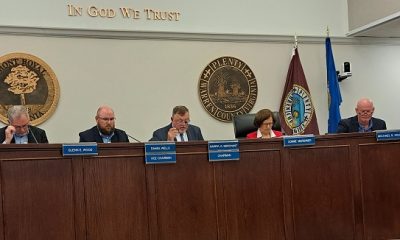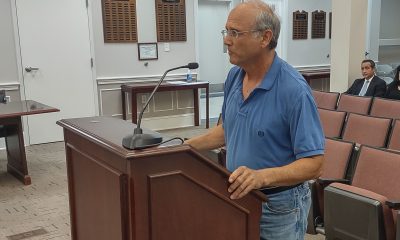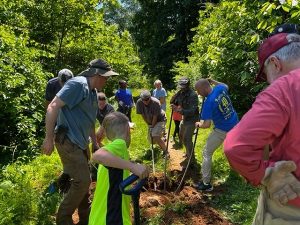Local Government
Town Administration beats Planning Commission to punch – releases report on Holloway LLC’s subdivision approval process Wednesday afternoon
While to this reporter’s knowledge we have yet to receive the promised “additional information” press release on recently hired Town of Front Royal Public Information Office (PIO) consultant to Fortune 500 companies among others, Joanne Williams and company, we know she/they are at work. For it is her name as Public Information Officer that is at the top of a town administration statement about the planning commission-initiated investigative report into the initial approval process for Mayor Chris Holloway’s construction company’s non-conforming subdivision request.
That press release and the report were released at 4:45 p.m., two and a quarter hours prior to a Front Royal Planning Commission meeting Wednesday night, November 17, at which the report’s public release was anticipated to be a major topic of discussion. And it still was a major topic, all four or was it five, dated versions of the report that appear to exist – see Stephen Sills coming planning commission story and accompanying town video for more detail.
The report, which for two months-plus was a topic of discussion only behind closed doors, was originally requested by the planning commission to be prepared by new Planning Director Lauren Kopishke. However, Commission Chairman Douglas Jones is reported to have later requested the inquiry be prepared by Town Attorney Doug Napier.
The release of the 20-page report on how Mayor Chris Holloway’s construction company’s non-conforming six-unit subdivision request was forwarded through the planning department and approved by council was accompanied by the new Front Royal PIOs five-paragraph overview of someone’s perception of what the report concludes.
The new PIOs conclusion, under the auspices of a Town Administration that was at the center of the report’s investigation, is this: “Following weeks of review, the Town Attorney concluded in his report that there was no wrongdoing by the Town Manager, Administration, staff, or Holloway Construction. While it appeared that more time could have been taken to review requests, the findings indicated that the mayor’s company was not given priority over other projects.”
The Public Information Office’s conclusion is that “Front Royal’s Town Manager, Administration, and staff are committed to following proper policy and procedures and will continue to do so in the future. In addition, the Town will be reviewing outdated policies and procedures to ensure consistency”.
However, page six of the attorney’s report appears to indicate actual and perceived pressure brought to bear on a planning department with only an interim director at the time: “In this case, it is clear from all staff reports that the Town Manager in effect personally ‘carried the ball’ for Mr. Holloway’s application by the Town Manager himself making sure that the Planning and Public Works Departments and their staffs knew that the Town Manager was overseeing the re-subdivision application for Mr. Holloway, and the Town Manager wanted this application expedited as quickly as possible.”
The report further notes not-so-subtle pressure being applied on the then Interim Planning Director: “The Town Manager himself fast-tracked the application and its approval in such a way that the re-subdivision plat was approved by the Interim Planning Director on the spot, as soon as it was presented to him by the Town Manager, in the presence of Mr. Holloway. The Town Manager called the Interim Planning Director to his office, while Mr. Holloway was there, and asked the Interim Planning Director to sign the re-subdivision plat right then, after the Town Manager himself had already signed it … the Interim Planning Director felt there was at least an implicit pressure to sign the re-subdivision plat as soon as it was presented to him – it was presented to him by his boss, the Town Manager, in the presence of the Mayor – the Interim Planning Director did not feel he had the time, nor did he take the time, to review the Town Code to be certain the correct Town Code procedures were being followed.”
Of the town manager’s “fast-tracking” the mayor’s application, the above paragraph does observe that: “It should be clearly and unambiguously stated that there is no current Town Code provision that states this it is impermissible for the Town Manager to do this, or for a Mayor or Town Councilman to have the Town Manager do this for them.”
Maybe that would be a good starting point for the Town’s promised review of “outdated policies and procedures to ensure consistency.”
See the entire November 17th Town Press Release and its attached “PLANNING COMMISSION INTERNAL INQUIRY REPORT” originally dated October 7 below.
Recommendation of Review of Front Royal’s Planning Department Policies & Procedures
On September 27, 2021, the Front Royal Town Council approved a private street to service a new 6-unit townhouse development for Chris Holloway Construction, LLC. Chris Holloway is Front Royal’s mayor, but he was not present during the town meeting. Council’s vote overruled a recommendation by the Planning Commission to deny approval. By law, Front Royal Town Council is not required to approve recommendations from appointed Boards and Commissions.
At the Planning Commission’s September 15, 2021, meeting, a motion asking Front Royal’s Planning Director to prepare a report on policy and procedures of the subdivision ordinance was approved. The motion focused on Chris Holloway Construction, LLC’s townhouse project. Later, the Chairman of the Planning Commission asked the Town Attorney to conduct the inquiry. The Town Attorney proceeded with the review even though he works directly for and represents Town Council.
Following weeks of review, the Town Attorney concluded in his report that there was no wrongdoing by the Town Manager, Administration, staff, or Chris Holloway Construction, LLC. While it appeared that more time could have been taken to review requests, the findings indicated that the mayor’s company was not given priority over other projects.
During the time of the request of Chris Holloway Construction, LLC, the Town was without a Planning Director and was in the process of filling the position. With a smaller staff, the Town Manager did not want any development projects delayed, so he offered assistance to Planning staff in moving all types of development projects forward, which included the Chris Holloway Construction, LLC plans. The Town Manager is authorized to approve all projects following the Planning Department’s review and recommendation, in addition to the Town Attorney’s review.
Front Royal’s Town Manager, Administration and staff are committed to following proper policy and procedures and will continue to do so in the future. In addition, the Town will be reviewing outdated policies and procedures to ensure consistency. The Planning Commission is scheduled to review the Town Attorney’s report tonight.
*Planning Commission report attached. (below)
CONFIDENTIAL: PROTECTED BY ATTORNEY/CLIENT PRIVILEGE EXEMPT FROM DISCLOSURE UNDER F.O.I.A.
MEMORANDUM
TO: CHAIRMAN AND MEMBERS OF PLANNING COMMISSION
Via LAUREN KOPISHKE, DIRECTOR OF PLANNING
FROM: DOUGLAS W. NAPIER, TOWN ATTORNEY
DATE: OCTOBER 7, 2021
RE: PLANNING COMMISSION INTERNAL INQUIRY REPORT
1. SUMMARY:
At the Planning Commission’s September 15, 2021 meeting, Planning Commissioner Darryl Merchant, on his own initiative, made the following motion, which was seconded and voted upon as follows:
RE: Motion made at the 9-15-2021 Planning Commission Regular Meeting.
Commissioner Merchant moved, seconded by Vice Chairman Marshner that the Front Royal Planning Commission ask the Planning Director, and/or designee, to investigate and determine the facts surrounding the circumvention of the subdivision ordinance regarding Minor Subdivision application FRSUB2852-2021. That the Planning Director, and/or designee, prepare a written report of facts for review by the Planning Commission and include recommendations, if any, that would prevent this situation from occurring again.
VOTE: Yes – Jones, Marshner, Gordon, Merchant, Ingram
No – N/A
Abstain – N/A
Absent – N/A
Initially, the inquiry was being conducted by the Director of Planning & Zoning. Subsequently, following some issues, the Chairman of the Planning Commission requested that the inquiry be conducted by the Town Attorney instead. This report is a summary of that inquiry.
Virginia is a Dillon Rule state, meaning that the powers of local governing bodies, judicial bodies, and administrative bodies are all “fixed by statute and are limited to those conferred expressly or by necessary implication”. “This rule is a corollary to Dillon’s Rule that municipal corporations [or any other local governmental body or agency] have only those powers expressly granted, those necessarily or fairly implied therefrom, and those that are essential and indispensable.” There is a statute which imposes upon planning commissions the “duties” to effectuate the intent of Chapter 22 of Title 15.2 of the Code of Virginia, which intent is to “improve the public health, safety, convenience, and welfare of their citizens and to plan for the future development of communities”. The primary method by which the “development of communities” is carried out is by the Comprehensive Plan and by the Zoning and Subdivision Ordinances. By statute, Zoning and Subdivision Ordinances and amendments thereto, and the Comprehensive Plan and amendments thereto, before being acted upon by the local governing body, first must have recommendations made by the local planning commission to the governing body.
The Code of Virginia allows local planning commissions to make investigations pertaining to its affairs. Further, case law in Virginia, following what appears to be the universal rule, has
“repeatedly held that an administrative officer or bureau may be invested with the power to ascertain and determine whether the qualifications, facts or conditions comprehended in and
required by the general terms of a law, exist in the performance of their duties, and especially when the performance of their duties is necessary for the safety and welfare of the public.”
However, I think the specific actions of local government employees as they relate to specific aspects of their performance of their job duties, in this matter as all others, should be left to their supervisors, including Town Council. I do think planning commissions have a core duty and responsibility to make recommendations to the governing bodies when the planning commission sees local land use ordinances and policies are in need of modification or are not being carried out properly or consistently, without the planning commission getting into the business of employee performance action.
This inquiry is not intended to make accusations or judgments on the part of anyone. That is not my role or the role of the Planning Commission. It does, however, find that the Town Code sets out the processes that are to be followed in given situations involving Town land use matters. When the processes set out in the Town Code are not followed, it creates undue burdens on Town staff and creates opportunities for mistakes that can ultimately harm both staff and applicants for Town land use decisions. It also can also cause the public and staff to feel that two procedural standards are being applied, depending upon who the person is. Most importantly to the land use applicant himself, when the law in the Town or State Code is not followed, there will almost always be serious repercussions, usually financial, to follow at some point, when a future lender or future buyer’s title examiner, land surveyor, or attorney discovers the legal error, because the applicant, when he sells the property that has the title defect, has to unconditionally guarantee title to the property in the deed of conveyance (“general warranty of title”). This warranty of title “runs with the land”, and, in effect, the problem never goes away until it is discovered and is corrected, by going back and re-doing the correct process and obtaining a special exception, if a future Town Council is willing, or filing a lawsuit to clear title.
In the facts set out here, it became clear that there was a desire and pressure for much faster than usual land use decision approval. This is understandable that a builder would want this. However, when dealing with complex land use issues, this in turn cause significant mistakes being made by Town staff, in the form of approval of a resubdivision plat and issuance of zoning permits that should not have happened when it did, before it should have, and without the required issuance of a special exception, had those mistakes not been caught after the mistakes were made. Had those mistakes not been caught, title to those lots would have been bad because the private street accessing the subdivision lots would not have been legal. To Town staff, this rush to approval was seemingly done to please the applicant, even in the absence of any overt pressure having been exerted by the applicant.
2. NORMAL PROCESS:
This matter involved an application for what was intended to be a minor subdivision (essentially, a subdivision of eight or fewer lots), plus approval of a private street and approval of the street’s name.
Town staff is clear and united as to the normal process to be followed in the case of an application for a subdivision or zoning permit that is received by the Department of Planning & Zoning. Town staff is also clear and united as to what in fact did happen in this matter, and how it differed from the normal and usual process.
Normally, Town policy is that all applications for minor subdivisions have a two (2) week review period to ensure a proper review period by the Town’s Department’s of Planning & Zoning, Public Works, and Energy Services. (Town Code actually formally allows a much longer period of time for minor subdivisions to be reviewed and acted upon, but Planning Department staff apparently follows the sketch plan review timeline set out in Town Code 148-405. B. 2.) This is in order to create the proper utility accounts, assignments of addresses, creation of the parcels into appropriate GIS form, gather up the appropriate documents and forward them to the Finance Department, Public Works, and Energy Services, for those Departments to do what the Town Code requires during that two week period before a zoning permit can be issued or a subdivision application can be approved, if it can be approved administratively by the Director of Planning & Zoning.
Typically, for a minor subdivision, which is what was intended in the situation that will be discussed here, a minimum of five copies of the subdivision plat, a completed subdivision application form, the appropriate administrative review fees, and appropriate supporting documentation would be submitted to the front desk of the Planning & Zoning Department. A receipt for the fees paid would then be created. The plat would then be assigned a reference number and the plat and application would be digitally entered into the EnerGov computer tracking system, EnerGov would notify applicable Town Departments, such as Public Works and Energy Services, to review the submitted documents. If, after this review, and review by the Director of Planning & Zoning that the requirements of the Subdivision and, if applicable, the Zoning, Ordinances have been complied with, the minor subdivision would then be approved.
During that two week period, in the case of a subdivision application, the typical process when Public Works receives a request for its review from Planning & Zoning is as follows:
The Public Works Department receives an email from Planning & Zoning with a plan (reference) number and link to connect to EnerGov software, which allows interconnectivity between the affected Town and County Departments. Public Works will log in to the appropriate Planning documents and print the appropriate application and plat and any other needed documents. Public Works has two (2) weeks to review if a Town application or plan and thirty (30) days if a County plan.
There are several different Town reviewers for Public Works besides the Department Head, who review for water, sewer, street and other infrastructure issues.
If Public Works marks the documents “COMPLETE” in EnerGov, there is something that needs to be changed or something(s) additional that needs to be submitted before Public Works will approve from its Departmental standpoint. If there is something to be fixed in the documentation that was submitted, Public Works will not submit the Water & Sewer Connections/System Development Charges attached in the documents as a way for Public Works to know that the Town needs to see updated changes to the application before it can be approved.
If Public Works marks “APPROVED” in EnerGov, it means Public Works has reviewed the application and plans, and nothing additional is needed. Water and Sewer Connections/System Charges are then attached in the documentation that Public Works sends back to Planning & Zoning along with the possibility that a Right of Way Permit may be needed if any curb and gutter work or other work in the Town’s right of way may be needed.
In the case of a minor subdivision plat approval, which is what was intended here, the normal process would be, after all the reviews have been finished and approved by all the other Town Departments, that the Director of Planning & Zoning would then approve and sign the plat, the Finance Director, to indicate the Town’s real estate taxes had been paid, and the Town Manager would sign the plat, and then it would be recorded in the Clerk’s Office of the Circuit Court.
All this is set out because these reviews are labor intensive and time consuming. As always with the Town, as in all local governments, there is an endless stream of such work, with applications and reviews before this one, and applications and reviews after it, one after another, on and on.
3. THIS APPLICATION:
There are two somewhat differing accounts of what happened here. The first are March, 2021 meetings that the Town Manager had with the then-Planning Director that was relied upon.
The other are events which happened in the summer of 2021 which other Town staff report.
4. MARCH, 2021 EVENTS, AS RELATED BY TOWN MANAGER.
The Town Manager states that on March 10, 2021, he, the Clerk of Town Council, and Chris Holloway met with then-Planning Director Tim Wilson to discuss what approvals, whether administrative, Planning Commission, or Town Council, would be needed for vacation of Carter Street. Mr. Holloway wanted to know this prior to purchasing the land and going through the vacation process. During this meeting, according to the Town Manager, Mr. Wilson advised Mr. Holloway that a private street did not need approval of the Planning Commission or Town Council.
Based upon this, the Town Manager computed the value of the property in Carter Street to be vacated and sold to Mr. Holloway based upon recent vacations and comparable sales values of
properties on Steele Streets and Commonwealth Drive, which were also provided to Town Council in Closed Meeting.
CORRECTION: Another meeting on March 30, 2021 with Mr. Wilson was held to discuss what was needed for Mr. Holloway to build a private street on this property he was purchasing from the Town and resubdividing. Mr. Wilson did not advise Mr. Holloway or the Town Manager that a “special use permit” [sic] was NOT needed.
5. SUMMER, 2021 EVENTS AS RELATED BY OTHER TOWN STAFF.
Without getting into the details of what the various individual members of Town staff related as to what happened, the following facts all Town staff members from all these affected Town Departments, both Planning & Zoning, and Public Works, do agree upon, and this seems to directly affect how the Planning Commission might want to consider going forward. In reviewing the individual written reports submitted by the various staff members from those Departments, as well as interviewing the Planning Director, Assistant Town Attorney and the Assistant Town Manager, this is what I have concluded:
This subdivision application was for Mr. Holloway, who is also, of course, the Mayor. Obviously, there is nothing wrong with Mr. Holloway making a living, and in the course of making a living, Mr. Holloway has as much a right to make application for local land use approvals of his property from the Town as does any other person.
In this case, it is clear from all staff reports that the Town Manager in effect personally “carried the ball” for Mr. Holloway’s application by the Town Manager himself making sure that the Planning and Public Works Departments and their staffs knew that the Town Manager was overseeing the resubdivision application for Mr. Holloway, and the Town Manager wanted this application expedited as quickly as possible.
It should be clearly and unambiguously stated that there is no current Town Code provision that states this it is impermissible for the Town Manager to do this, or for a Mayor or Town Councilman to have the Town Manager do this for them.
The Town Manager himself fast-tracked the application and its approval in such a way that the resubdivision plat was approved by the Interim Planning Director on the spot, as soon as it was presented to him by the Town Manager, in the presence of Mr. Holloway. The Town Manager called the Interim Planning Director to his office, while Mr. Holloway was there, and asked the Interim Planning Director to sign the resubdivision plat right then, after the Town Manager himself had already signed it. Because the resubdivision application was to include a private street, Town Code requires that a special exception to be granted by Town Council. This special exception process has not been applied for within the experience of anyone in the memory of current staff, and therefore no one was familiar with it. Because of that unfamiliarity, and because the Interim Planning Director felt there was at least an implicit pressure to sign the resubdivision plat as soon as it was presented to him — it was presented to him by his boss, the Town Manager, in the presence of the Mayor — the Interim Planning Director did not feel he had the time, nor did he take the time, to review the Town Code to be certain the correct Town Code procedures were being followed.
As a result, the correct Town Code procedures were not followed, notwithstanding what former Town Planning Director Tim Wilson may have said. What the Town Code very clearly states “Subdivisions on new non-dedicated private streets may be permitted upon the approval of a special exception by Town Council.” Town Code further states that special exceptions may be granted only after the Planning Commission first makes a recommendation to Town Council as to the special exception following the Commission’s public hearing, which itself is following public advertisement once a week for two consecutive weeks in a newspaper, which is required by the Code of Virginia. That recommendation is to be followed by another public hearing by Town Council and approval of the special exception application, after the same public hearing requirements. That process was not followed, which Town Code required, before the Interim Planning Director and the Town Manager, approved and signed the resubdivision plat, and that plat was recorded and zoning permits issued. Because the special exception had not been approved for the private street in accordance with those laws, the resubdivision plat should not have been signed as approved, and the zoning permits were not properly issued and were a legal nullity.
In addition, the Town Manager himself understandably could have felt pressure to fast-track this application, since the application was for the Mayor. The reports of the individual Town staff members of both the Planning and Public Works Department clearly indicate that they felt pressured, implicitly at least, to get their respective Departmental reviews of this application completed within that same business day if at all possible, when the Town’s usual policy was two weeks. While Town Code only makes a recommendation as to this two week period, it should be recalled that Town staff always has a lot of work to do which are already in the queue ahead of any given application, not just for certain people who apply later one but want to have their application finished and approved first.
It was only after the current Planning Director was hired, when she discovered that the special exception requirement was not followed, that this matter was begun to be brought to a head. As earlier noted, all of this is no abstract, bureaucratic or legalistic mumbo-jumbo, or mere time-consuming annoyance, but one which everyone should be grateful was caught when it was. When Mr. Holloway sells the lots, he will convey each one with a “general warranty of title”. A general warranty of title means that the owner, his heirs and personal representatives will forever warrant, or guarantee, and defend the said property to the grantee (buyer), the buyer’s heirs, personal representatives and assigns (purchasers from the buyer, and purchasers from the buyer’s purchasers, forever, against the claims and demands of all persons whomsoever. Va. Code § 55.1-110; Booker T. Washington Const. & Design Co. v. Huntington Urban Renewal Authority, 383 S.E.2d 41, 181 W.Va. 409 (W. Va. 1989). As an example, the Town had a major title issue earlier this year when the Town did not clear up title to property on Hill Street when it should have back in the 1980s. The title problem was discovered earlier this year during the course of the sale of the property, and it caused some significant problems both for the purported owners of the property, who discovered that in fact they did not own the property even though they had paid for it, and for the Town.
6. POLICY RECOMENDATIONS
In order help everyone in the future preserve the integrity of the land use review process and reduce the appearance of impropriety, as well as to help ensure adequate staff time to review applications, the following is recommended as policy, and can even be implemented as part of the Town Code in the Subdivision and Zoning Ordinances:
a) All applications must be processed directly through the Department of Planning & Zoning, at that office itself.
i) The Town Manager, Town Attorney, and Assistant Town Attorney are not authorized to accept Subdivision or Zoning applications to be processed through the Planning Department.
b) No staff member who reports to the Director of Planning will attend a request for a meeting with any Town Manager, Members of Town Council, or appointed Town Official, alone. Planning & Zoning staff should not put themselves into a position where they could be asked to sign or review a document that has not been officially submitted. Planning & Zoning staff must avoid situations where there are no independent, impartial persons who can attest to the nature of the meeting.
i) By requiring the Planning Director, Assistant Town Manager, or Town Attorney to be present in any meeting it protects all parties present.
ii) Concerns of improper pressure will not exist because staff will not be placed into a situation where it is one person’s word against another.
iii) Persons in positions of authority have the ethical responsibility of making sure they do not use their position to influence the actions of staff in any manner inconsistent with
staff’s job duties or with Town policies.
c) The Town’s Subdivision Ordinance is confusing and in some area’s conflicts with the Town’s Zoning Ordinance. It is difficult for staff to navigate the documents at times and even more so for the general public who may not have exposure to the language contained in an Ordinance.
To mitigate the confusion of the Ordinance staff will:
i) Begin working on a general development guide, outlining the proper process for those who are interested in undertaking development projects. This guide will be printed in the office and posted on the Town’s Website.
ii) Staff will also require pre-application meetings for all zoning and subdivision submissions. This will allow Staff to sit down, face to face, with the applicant and explain the process and provide the necessary applications.
iii) Staff will have not less than two (2) weeks to review and process Subdivision and Zoning applications for land located within Town limits in order to help ensure that proper laws and policies are being followed.
iv) Staff has begun the process of revising the actual application document for clarity. During the pre-application meeting, staff should review the application, page by page, with each applicant and explain how each page should be completed. This will ensure a completed application is submitted which reduces review times and increases efficiency of the review process.
v) As part of the application revisions, staff will develop checklists for each type of land use application which applicants will complete and sign. If the checklists are not completed, the application will not be accepted by staff.
______________________________________________________________________________
FOOTNOTE
7. APPLICABLE LAW IN TOWN CODE :
148-130 ADMINISTRATION
The Director of Planning and Zoning, hereafter referred to in this Ordinance as the “Director”, shall administer this Ordinance. The Director may establish such administrative rules and
procedures as deemed necessary, under the general direction and guidance of Council.
148-160 INTERPRETATION; WORD USAGE
***
C. This Chapter shall be used and interpreted in conjunction with the provisions of Chapter 175, Zoning, and other applicable ordinances of the Town of Front Royal.
D. In the event a term is not defined in this Chapter, the Director shall refer to other Chapters of the Front Royal Code for guidance and to Virginia Code § 15.2-2201 as amended. If ambiguity
remains, the Director shall then rely on the conventional, recognized meaning of the word or phrase (e.g. the current edition of Merriam-Webster’s Dictionary).
148-180 SUBDIVISION APPROVAL AND RECORDING REQUIRED
A. Whenever any subdivision of land is proposed, before any sale, exchange, transfer, or recordation is made of any subdivided part thereof and before any permit for the erection of a structure in such proposed subdivision shall be granted, the applicant shall apply for and secure approval from the Town of Front Royal of such proposed subdivision, in accord with all provisions of this Chapter. Plats for each and every separate parcel comprising the source tract, to include all primary and residual subdivided parcels, shall be required to be submitted for approval. Upon approval, plats shall be recorded among the Land Records of Warren County, Virginia.
B. Hereafter all plans for the subdivision of land within the corporate limits of the Town of Front Royal shall be reviewed and acted upon by the appropriate town, state or other officials in accord with procedures and other requirements as may be provided for in this Chapter. Any change in a recorded plat shall constitute a re-subdivision and shall make said plat subject to any and all of the requirements of this Chapter.
C. No plan or plat for the subdivision of land within the corporate limits of the Town of Front Royal shall be approved unless and until all Town real estate taxes, delinquent taxes, including interest and penalty, on the entire parcel to be subdivided have been paid in full. The Director shall notify the Director of Finance that the plan or plat is ready for signature approval after all review agency comments have been addressed. The Director of Finance shall then be the first person to sign the plans or plats under the notation that all Town real estate taxes have been paid in full.
D. The Town shall not approve a subdivision of land if, after adequate investigations conducted by all public agencies concerned, it has been determined that in the best interest of the public, the site is not suitable for platting and development purposes of the kind proposed. Provisions of this chapter shall be relied upon to determine suitability.
148-200 COMPLIANCE REQUIRED
A. The Warren County Clerk of Court shall not file or record a plat of a subdivision until such plat has been approved as required herein. The penalties provided herein shall apply to any failure to
comply with the provisions of this Chapter.
B. No zoning clearance permit will be issued by any administrative officer of the Town of Front Royal, for the construction of any building or other improvement requiring a permit upon any land for which a subdivision plat or site development plan is required, unless and until the requirements of this Chapter have been complied with. Any person aggrieved by the decision of any administrative official whose decision is required pursuant to this Chapter may appeal said decision to the Town Council.
148-211 SPECIAL EXCEPTIONS
A. A special exception to the general regulations of this Chapter may be granted by Town Council, for either of the following circumstances:
1. When strict adherence to the general regulations would result in substantial injustice or hardship; provided that, the special exception would not diminish public health, safety or general welfare, including, but not limited to, consideration that adequate provisions are provided to ensure long-term maintenance of public and shared private facilities, and conformance with the goals and objectives of the Comprehensive Plan.
2. When it is demonstrated that use of alternative regulations for a particular development would better achieve at least one of the goals listed below; provided that, the special exception would not diminish public health, safety or general welfare, including, but not limited to, consideration that adequate provisions are provided to ensure long-term maintenance of public and shared private facilities, and conformance with the goals and objectives of the Comprehensive Plan.
a. Creation of affordable housing.
b. Design emphasis on the principles of traditional neighborhood design, including pedestrian-friendly roads, interconnection of new local streets with existing local streets, connectivity of pedestrian networks, and mixed-use neighborhoods.
c. Conservation or use of on-site natural features to protect water quality or open spaces.
B. Any request for an exception, shall be submitted to the Director, and shall include a signed and completed application form, any application fees, and any supporting documentation submitted by the applicant.
C. Prior to approval or denial of any request for an exception, the Planning Commission shall hold a public hearing, in accordance with Virginia Code § 15.2-2204, to review and provide
recommendations to Town Council.
D. Prior to approval or denial of any exception to the design standards of this Chapter, Town Council shall hold a public hearing, in accordance with Virginia Code § 15.2-2204. [Emphasis
Added.]
E. Town Council may impose such conditions or restrictions upon the premises benefited by an exception as may be necessary to comply with intent of this Chapter and to protect the public
interest, safety and/or general welfare.
Title 15.2 Counties, Cities and Towns
Chap. 22 Planning, Subdivision of Land and Zoning, §§ 15.2-2200 — 15.2-2329
Art. 1 General Provisions, §§ 15.2-2200 — 15.2-2209.2
Va. Code § 15.2-2204. Advertisement of plans, ordinances, etc.; joint public hearings; written notice of certain amendments. —
A. Plans or ordinances, or amendments thereof, recommended or adopted under the powers conferred by this chapter need not be advertised in full, but may be advertised by reference. Every such advertisement shall contain a descriptive summary of the proposed action and a reference to the place or places within the locality where copies of the proposed plans, ordinances or amendments may be examined.
The local planning commission shall not recommend nor the governing body adopt any plan, ordinance or amendment thereof until notice of intention to do so has been published once a week for two successive weeks in some newspaper published or having general circulation in the locality; however, the notice for both the local planning commission and the governing body may be published concurrently. The notice shall specify the time and place of hearing at which persons affected may appear and present their views, not less than five days nor more than 21 days after the second advertisement appears in such newspaper. The local planning commission and governing body may hold a joint public hearing after public notice as set forth hereinabove. If a joint hearing is held, then public notice as set forth above need be given only by the governing body. The term “two successive weeks” as used in this paragraph shall mean that such notice shall be published at least twice in such newspaper with not less than six days elapsing between the first and second publication. In any instance in which a locality in Planning District 23 has submitted a timely notice request to such newspaper and the newspaper fails to publish the notice, such locality shall be deemed to have met the notice requirements of this subsection so long as the notice was published in the next available edition of a newspaper having general circulation in the locality. After enactment of any plan, ordinance or amendment, further publication thereof shall not be required. [Emphasis added.]
B. When a proposed amendment of the zoning ordinance involves a change in the zoning map classification of 25 or fewer parcels of land, then, in addition to the advertising as required by subsection A, written notice shall be given by the local planning commission, or its representative, at least five days before the hearing to the owner or owners, their agent or the occupant, of each parcel involved; to the owners, their agent or the occupant, of all abutting property and property immediately across the street or road from the property affected, including those parcels which lie in other localities of the Commonwealth; and, if any portion of the affected property is within a planned unit development, then to such incorporated property owner’s associations within the planned unit development that have members owning property located within 2,000 feet of the affected property as may be required by the commission or its agent. However, when a proposed amendment to the zoning ordinance involves a tract of land not less than 500 acres owned by the Commonwealth or by the federal government, and when the proposed change affects only a portion of the larger tract, notice need be given only to the owners of those properties that are adjacent to the affected area of the larger tract. Notice sent by registered or certified mail to the last known address of such owner as shown on the current real estate tax assessment books or current real estate tax assessment records shall be deemed adequate compliance with this requirement. If the hearing is continued, notice shall be remailed. Costs of any notice required under this chapter shall be taxed to the applicant.
When a proposed amendment of the zoning ordinance involves a change in the zoning map classification of more than 25 parcels of land, or a change to the applicable zoning ordinance text regulations that decreases the allowed dwelling unit density of any parcel of land, then, in addition to the advertising as required by subsection A, written notice shall be given by the local planning commission, or its representative, at least five days before the hearing to the owner, owners, or their agent of each parcel of land involved, provided, however, that written notice of such changes to zoning ordinance text regulations shall not have to be mailed to the owner, owners, or their agent of lots shown on a subdivision plat approved and recorded pursuant to the provisions of Article (§ 15.2-2240 et seq.) where such lots are less than 11,500 square feet. One notice sent by first class mail to the last known address of such owner as shown on the current real estate tax assessment books or current real estate tax assessment records shall be deemed adequate compliance with this requirement, provided that a representative of the local commission shall make affidavit that such mailings have been made and file such affidavit with the papers in the case. Nothing in this subsection shall be construed as to invalidate any subsequently adopted amendment or ordinance because of the inadvertent failure by the representative of the local commission to give written notice to the owner, owners or their agent of any parcel involved.
The governing body may provide that, in the case of a condominium or a cooperative, the written notice may be mailed to the unit owners’ association or proprietary lessees’ association, respectively, in lieu of each individual unit owner.
Whenever the notices required hereby are sent by an agency, department or division of the local governing body, or their representative, such notices may be sent by first class mail; however, a representative of such agency, department or division shall make affidavit that such mailings have been made and file such affidavit with the papers in the case.
A party’s actual notice of, or active participation in, the proceedings for which the written notice provided by this section is required shall waive the right of that party to challenge the validity of the proceeding due to failure of the party to receive the written notice required by this section.
C. When a proposed comprehensive plan or amendment thereto; a proposed change in zoning map classification; or an application for special exception for a change in use or to increase by greater than 50 percent of the bulk or height of an existing or proposed building, but not including renewals of previously approved special exceptions, involves any parcel of land located within one-half mile of a boundary of an adjoining locality of the Commonwealth, then, in addition to the advertising and written notification as required by this section, written notice shall also be given by the local commission, or its representative, at least 10 days before the hearing to the chief administrative officer, or his designee, of such adjoining locality.
D. When (i) a proposed comprehensive plan or amendment thereto, (ii) a proposed change in zoning map classification, or (iii) an application for special exception for a change in use involves any parcel of land located within 3,000 feet of a boundary of a military base, military installation, military airport, excluding armories operated by the Virginia National Guard, or licensed public-use airport then, in addition to the advertising and written notification as required by this section, written notice shall also be given by the local commission, or its representative, at least 30 days before the hearing to the commander of the military base, military installation, military airport, or owner of such public-use airport, and the notice shall advise the military commander or owner of such public-use airport of the opportunity to submit comments or recommendations.
E. The adoption or amendment prior to July 1, 1996, of any plan or ordinance under the authority of prior acts shall not be declared invalid by reason of a failure to advertise or give notice as may be required by such act or by this chapter, provided a public hearing was conducted by the governing body prior to such adoption or amendment. Every action contesting a decision of a locality based on a failure to advertise or give notice as may be required by this chapter shall be filed within 30 days of such decision with the circuit court having jurisdiction of the land affected by the decision. However, any litigation pending prior to July 1, 1996, shall not be affected by the 1996 amendment to this section.
F. Notwithstanding any contrary provision of law, general or special, the City of Richmond may cause such notice to be published in any newspaper of general circulation in the city.
G. When a proposed comprehensive plan or amendment of an existing plan designates or alters previously designated corridors or routes for electric transmission lines of 150 kilovolts or more, written notice shall also be given by the local planning commission, or its representative, at least 10 days before the hearing to each electric utility with a certificated service territory that includes all or any part of such designated electric transmission corridors or routes.
H. When any applicant requesting a written order, requirement, decision, or determination from the zoning administrator, other administrative officer, or a board of zoning appeals that is subject to the appeal provisions contained in § 15.2-2311 or 15.2-2314, is not the owner or the agent of the owner of the real property subject to the written order, requirement, decision or determination, written notice shall be given to the owner of the property within 10 days of the receipt of such request. Such written notice shall be given by the zoning administrator or other administrative officer or, at the direction of the administrator or officer, the requesting applicant shall be required to give the owner such notice and to provide satisfactory evidence to the zoning administrator or other administrative officer that the notice has been given. Written notice mailed to the owner at the last known address of the owner as shown on the current real estate tax assessment books or current real estate tax assessment records shall satisfy the notice requirements of this subsection.
This subsection shall not apply to inquiries from the governing body, planning commission, or employees of the locality made in the normal course of business. (Code 1950, § 15-961.4; 1962,
c. 407, § 15.1-431; 1964, c. 632; 1968, cc. 354, 714; 1973, cc. 117, 334; 1974, cc. 100, 570; 1975, c. 641; 1976, c. 642; 1977, c. 65; 1982, c. 291; 1990, c. 61; 1992, cc. 353, 757; 1993, cc. 128, 734; 1994, c. 774; 1995, c. 178; 1996, cc. 613, 667; 1997, c. 587; 2001, c. 406; 2002, c. 634; 2004, cc. 539, 799; 2005, c. 514; 2007, cc. 761, 813; 2011, c. 457; 2012, c. 548; 2013, cc. 149, 213; 2020, cc. 22, 761.)
History
148-220 VIOLATIONS AND PENALTIES
Any person, firm or corporation violating, causing or permitting the violation of any of the provisions of this Chapter shall be guilty of a misdemeanor and, upon conviction thereof, may be punishable by a fine of not less than $10 nor more than $1,000. If the violation is uncorrected at the time of the conviction, the court shall order the violator to abate or remedy the violation in compliance with the zoning ordinance, within a time period established by the court. Failure to remove or abate a zoning violation within the specified time period shall constitute a separate misdemeanor offense punishable by a fine of not less than $10 nor more than $1,000, and any such failure during any succeeding 10-day period shall constitute a separate misdemeanor offence for each 10-day period punishable by a fine of not less than $100 nor more than $1,500.
148-320 FINAL SUBDIVISION PLAT RECORDATION REQUIREMENTS
The purpose of good subdivision and site development design is to create a functional and attractive development, to minimize adverse impacts and to ensure that a project will be an asset to the general welfare of the community. To promote this purpose, all subdivision and site development plans shall conform to the standard herein, which are designed to result in a well-planned community without adding unnecessarily to the cost of development.
148-401 PRE-APPLICATION PROCEDURE
A pre-application consultation between the applicant and the Director is encouraged prior to the submission of any proposed subdivision. This is desirable to minimize development planning costs, to avoid misunderstanding or misinterpretation and to ensure compliance with the requirements of this Chapter. Representations made at pre-application meetings shall not be binding on the Town or the applicant.
148-405 SKETCH PLAN SUBMISSION REQUIREMENTS AND REVIEW PROCEDURES
A. Sketch Plan Submission Procedures.
1. A sketch plan of the proposed minor subdivision may be submitted prior to the preparation of engineered plans. In such cases, a sketch plan shall be considered a submission for informal discussion and shall not constitute official submission of a plan to the Town. A sketch plan shall be submitted to the Director in numbers sufficient for distribution to and/or review by appropriate Town departments. The sketch plan shall be prepared in accordance with the detail requirements of Section 148-1005.
2. Additional information may be provided at the option of the applicant.
B. Sketch Plan Review Procedures.
1. The sketch plan shall be reviewed administratively by the appropriate Town departments, taking into consideration the requirements of the Subdivision and Zoning Ordinances, the arrangement, location and width of streets, the topography of the land, sewage disposal, water supply, drainage and stormwater control, lot sizes and lot arrangement, further development of adjoining lands, the guidelines of the Town Comprehensive Plan and the requirements of other plans and ordinances as adopted by the Town. The advice of other officials or consultants may be sought in reviewing a sketch plan. Within one week of receipt by the Director, the sketch plan submission shall be reviewed for completeness. If found complete, it shall be immediately forwarded to the appropriate Town departments for review.
2. The reviewing departments shall have two (2) weeks for the review of the sketch plan and to provide written comments to the Director. The Director shall then contact the applicant and schedule a meeting to discuss any changes or modifications regarding any aspect of the plan that will be required for approval of future plan submissions. These discussions are informal and will not result in an official summary letter to the applicant, but are intended to serve as a guideline in the preparation of plans.
148-415 MINOR SUBDIVISION SUBMISSION REQUIREMENTS AND REVIEW PROCEDURES
A final subdivision plat is required for all minor subdivisions.
A. Minor Subdivision Submission Procedures.
1. An applicant shall submit a minor subdivision application form and checklist for a final subdivision plat to the Director along with sufficient number of the plat for distribution to and review by the appropriate Town departments.
2. The application shall be accompanied by a nonrefundable filing fee in the amount set in the schedule of fees.
B. Final Subdivision Plat Detail Requirements. The final subdivision plat shall be prepared by a land surveyor or professional engineer licensed by the Commonwealth of Virginia and shall conform to the Standards for Plats of the Virginia State Library Board (17VAC15-60-10, et seq). The Final Plat shall be prepared in accordance with the detail requirements of Section 148-1035.
C. Supplemental Data to Accompany Minor Subdivision Submission.
1. An overlot grading plan or generalized development plan as determined by the Director. The overlot grading plan and/or generalized development plan shall be prepared in accord with the requirements contained herein.
2. In the event that public water and/or sewer is not available to the site to be subdivided, a certificate of appropriate approval of the State Health Department for the water supply and/or sanitary sewage disposal system(s) for a proposed subdivision. If individual on-site sewage disposal systems are to be used, the applicant shall submit Health Department tentative approval of each lot in the subdivision as having a suitable site for a septic system at the state lot size. This shall be done on a lot-by-lot basis. This tentative approval does not guarantee the issuance of a permit for a septic system when construction occurs. The State Health Department reserves the right to withdraw any tentative approval at the time a permit for a septic system is applied for.
D. Minor Subdivision Review Procedures.
1. The Director shall determine whether the submitted plat, plan and application is complete, in accord with this Chapter. The Director must notify the applicant of any items that are required to make the application complete and eligible for official submission within ten (10) business days of submission. The date of official acceptance of the application by the Town shall be noted on the application.
2. After official acceptance of the application, the Director shall submit the plat and plan to the appropriate Town departments for review. The Director shall take action on the application within 60 days of submission. However, if approval of a feature or features of the proposed subdivision by a state agency or public authority is necessary, the commission or agent shall forward the plat and plan to the appropriate state agency or agencies for review within 10 business days of receipt of such plat or plan. Upon receipt of the approvals from all state agencies, the Director shall act upon the submission within 35 days.
3. The Director shall not approve any plan or plat until such plan or plat comply with the Town Code and until all required modifications are made. The Director shall notify the applicant if the plan or plat is disapproved, in writing, and the reasons for disapproval shall be specifically enumerated and the modifications or corrections necessary for approval shall be identified.
4. The Director shall act on any subdivision plan and plat that was previously disapproved within 45 days after the plan has been modified, corrected and resubmitted for approval.
5. If the review is favorable, the plat will be signed by the Director, the Director of Finance and the Town Manager, with the date of action.
E. As-built Survey Required.
1. An as-built plan is required for all minor subdivision overlot grading plans. The as-built drawing shall be prepared in accordance with the detail requirements of Section 148-1025.
148-820 STREET DESIGN
A. General Standards
1. All streets shall be dedicated to the Town of Front Royal for public use, and shall be designed, engineered and constructed to the public street design standards found within the Construction Standards and Specifications Manual.
2. Proposed subdivisions and developments shall coordinate the location, width and other street improvements associated with proposed streets with existing and planned streets that are contiguous to, or within, the property boundaries. For the purposes of this subsection, planned streets shall include streets, rights-of-way, and street improvements designated as a future road improvement by the Town of Front Royal Comprehensive Plan. Town Council, upon recommendation by the Planning Commission, may waive this requirement where the continuation of the planned, existing or platted street will create adverse traffic impacts.
a. The proposed street system shall extend existing or planned streets at the same width or larger, but at not less than the required minimum width as specified in this chapter. Where possible, a new intersection into an existing street shall align with an existing street intersection on the opposite side of such street.
b. Streets that are designated for continuation to adjoining properties shall be designed and constructed to the property line with a temporary cul-de-sac turnaround, or other temporary turn-around approved by the Town.
3. Whenever a property proposed for subdivision or development abuts or contains an existing public street that does not meet the minimum right-of-way width requirements of this article, additional right-of-way shall be provided on each side of the existing public street abutting the proposed subdivision or development so the minimum right-of-way width requirement is ultimately achieved.
4. On-site road improvements shall be required for new subdivisions or developments based on the requirements of this chapter.
5. In accordance with Virginia Code §15.2-2242.A.4, the Town may accept certain off-site road improvements that are reasonable and necessary, the need for which is substantially generated and reasonably required by the construction or improvement of the subdivision or development. Off-site road improvements may include, but are not limited to, acceleration and deceleration lanes, a center turning lane, a parallel service drive, reverse frontage lots, and/or the dedication of additional right-of-way.
6. In accordance with Virginia Code §15.2-2242.A.4, the Town may develop reasonable provisions for the advancement of payments for, or construction of, reasonable and necessary road mprovements located outside the property limits of the land owned or controlled by the subdivider or development, the need for which is substantially generated and reasonably required by the construction or improvement.
7. Private lanes or streets shall not be authorized for any new or existing subdivision or development without approval by the Town in accordance with Section 148-820.N.
N. Private Streets, Common Driveways, and Common Parking Courts.
***
b. Subdivisions on new non-dedicated private streets may be permitted upon the approval of a special exception by Town Council. In addition to the general submission requirements for special exceptions, as prescribed under this Chapter, requests for private streets through the special exception process shall include a concept plan prepared by a Virginia registered architect, landscape architect, land surveyor or engineer with seal and signature affixed to the plan. The plan shall be approximately to scale and clearly show the following:
[1] Location map showing existing zoning and ownership of property and adjacent land;
[2] Identification of principal site features, including topography, steep slopes, wetlands, wooded areas, archeological areas, floodplains, and other features of significant public interest.
[3] Relationship of the proposal with surrounding utilities and public facilities to serve the tract at the ultimate proposed densities;
[4] A general layout of the road system within the project, including all proposed private and public streets and land uses.
[5] Detailed information on the proposed private street standards with an explanation of the reason for any modifications to the public street standards of this Chapter.
[6] A description of the provisions for continued maintenance of any proposed private street.
[7] A description of the private deed restrictions that will be provided as notice to future property owners regarding the limitations of service available on any proposed private streets.
ARTICLE 9 – DEFINITIONS
148-900 DEFINITIONS
As used in this Chapter, the following terms shall have the meanings indicated:
***
SUBDIVISION – The division of a parcel of land into separate parts, under the terms of this Chapter, regardless of whether the parts are held, developed, sold, leased, rented or transferred. The term includes resubdivision, and, when appropriate to the context, shall relate to the process of subdividing or to the land subdivided.
***
SUBDIVISION, MAJOR – Any subdivision other than a minor subdivision.
SUBDIVISION, MINOR – A subdivision that does not involve any of the following: the creation of more than a total of eight (8) lots, the creation of any new public streets, the extension of a public water or sewer system, or the installation of drainage improvements through one (1) or more lots to serve one (1) or more other lots.
Local Government
Town Planning Commission Tackles Motel-Apartment Conversion, Elects New Chairman
The Front Royal Planning Commission, presided over by Acting Chairman Connie Marshner in the absence of its former Chairman Daniel Wells, who submitted his resignation last week, met Wednesday, April 17, to hold public hearings on six Special Use Permit (SUP) applications. Acting Chair Marshner announced that an election for a new chairman would be added to the end of the agenda due to former Chairman Wells resignation. Commissioner Glenn Wood moved to add the election to the agenda, and Commissioner Michael Williams seconded. The commission voted unanimously for the addition.
There were no citizen comments from the nearly empty meeting room, and the commissioners voted unanimously to approve a one-item Consent Agenda, Authorization to Advertise for Public Hearing a single SUP submitted by Abode of Liberation for a lodging house at 1324 Old Winchester Pike.
There were seven public hearings:
Baymont Inn Apartment Conversion
The major business of the meeting was a pair of requests from CCC Enterprises LLC of VA for a property at 10 South Commerce Avenue, which was familiar to residents as the Baymont (former Quality Inn). First was a SUP application to convert the 3-story motel into a 39-unit apartment building. The property is zoned C-1, Community Business District.
Zoning Administrator Ware cautioned the commission that they were being asked to vote only on the proposed use for the property, not the site plan or other permits. The applicants presented a concept site plan showing a mix of one and two-bedroom units around green space and a swimming pool. The configuration as presented included 24 one-bedroom units, 2 one-bedroom with a den, and 12 two-bedroom units. However, the specific mix of units may change as the process moves forward. The applicants have not yet established pricing for the units, as it is too early in the process to determine. The applicants assert that the proximity of the property to the downtown area will be beneficial, as the tenant mix is intended to consist of young professionals and couples rather than families with children. The Planning Department summary indicates that this use is in conformance with the Town’s Comprehensive Plan and could provide badly needed housing. Commissioner Wood indicated “quite a bit of interest” in the project from downtown business owners, who will want to know “What type” of tenants the development would yield.
“What they do not want is for this to become low-income rentals”, Wood said. “I would suggest that as this process moves forward, you should be prepared to address that.” The applicant, Sam Sharma, told the commission that they were looking for local tenants only – predominantly “workforce” – cited as “teachers, firefighters, people who have restaurants on Main Street – that’s the goal we are trying to meet.”
At the public hearing, surprisingly, given the publicity for the proposal, there were no public comments either for or against it.

Sam Sharma, left at the podium, and Kyle Hopkins, the applicants for a Special Use Permit for the Baymont Inn property on Commerce Ave., address the Front Royal Planning Commission to explain their concept of a 3-story apartment structure to provide ‘workforce housing’ adjacent to the downtown area.
The Planning Department’s summary lists only one condition for the SUP: two parking spaces must be provided for each apartment. Acting Chair Marshner asked if “a third party” might be paying rent for tenants. Answer: “No.” After some discussion about the merits of the proposed use, on a motion by Commissioner Matthiae, seconded by Commissioner Williams, the commission voted unanimously in favor of a recommendation for approval by the Town Council.
The second request from CCC Enterprises LLC of VA is a request for a Special Exception for the property also located at 10 S. Commerce Avenue, identified by Tax Map 20A8-22-6, for a reduction in the required parking space size from 10 x 20 feet to 9 x 18 feet, and a reduction of the required parking area setback of thirty feet (30’) from the property lines. The property is zoned C-1, Community Business District. Approval of this exception is a condition of the CUP for the use as apartments, as the property could not be redeveloped under this proposal if the parking changes were not approved. Zoning Administrator Ware explained the requirement to the commission and showed that a boundary setback of 30 feet would eliminate the majority of parking spaces. As proposed, the parking spaces combined result in “a few more” than the 78 required.
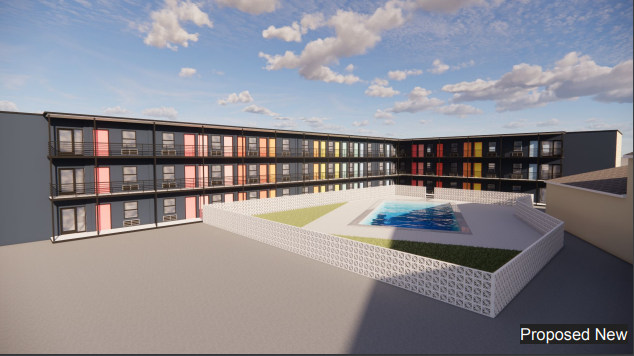
Artist’s conception of a 39-unit apartment building where the Baymont Inn now stands at 10 South Commerce Ave.
After further discussion, Commissioner Matthiae made a motion, seconded by Commissioner Wood, to recommend approval. The vote for approval was unanimous.
Other Business
In other public hearings, Karen Reynoso has submitted a request for a Special Use Permit to allow a short-term rental at 1400 Old Winchester Pike. Zoning Administrator John Ware told the Commission that the application and the property were in full compliance with the Town’s ordinances. The property is zoned Residential (R-2). With no discussion on a motion by Commissioner Wood, seconded by Commissioner Brian Matthiae, the commission voted unanimously to recommend approval.
Short Street Properties LLC is requesting a SUP to allow a ground floor dwelling unit at 519 Short Street; the property is zoned C-1, Community Business District. In the business districts residential dwellings are only permitted by SUP. Zoning Administrator John Ware told the commission that this property has a Residential structure in the front of the lot and a commercial use shop in the rear. Due to fire damage, the property has not been occupied for over two years, and the applicant intends to renovate it inside and out

Permit applicant Chris Grady tells the Town Planning Commission that he plans to renovate a property at 519 Short Street as two dwelling units.
Under the town’s zoning ordinance, if a legally nonconforming use has been discontinued for two years, it must be brought into compliance with the current standard. Since the Commercial District allows ground-floor dwelling units only by SUP, the applicant has submitted the request. Property Owner Chris Grady addressed the commission and described the project to restore the vacant, burned-out property to two dwelling units. There were no speakers either for or against the request. Commissioner Wood asked about the presence of stored vehicles at the back of the property, and the applicant said that the owner had agreed to clean up that area prior to closing. The applicant asked if there was a danger that a permit for the use could be denied once the purchase and renovations were complete. Town Planning Director Lauren Kopishke said that was the reason for getting the Special Use Permit before the work is completed, to reduce the denial risk for the applicant. After further discussion on Commissioner Natthiae’s motion, seconded by Commissioner Wood, the commission voted unanimously to recommend approval.
Edwin S. Wright submitted a request for a Special Use Permit to allow a ground-floor dwelling unit at 514 South Royal Avenue. This property is zoned C-1, Community Business District. It was previously in use as a residential dwelling but has been vacant for several years. The applicant plans to renovate the property with two dwelling units, One a 4-bedroom 2-story, and one a basement 2-bedroom. As with the previous SUP request, the legally non-conforming property must now comply with the current Zoning Ordinance to re-establish the residential use. There were no speakers at the public hearing. During the discussion, Commissioner Williams asked if the requirement for parking spaces in the town ordinance had to be met before the permit was issued. Zoning Administrator Ware said that parking spaces were a requirement for permit issuance. On a motion by Commissioner Williams, seconded by Commissioner Wood, the commission voted unanimously to recommend approval.
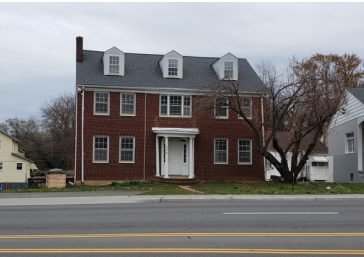
Edwin Wright submitted a proposal for a special use permit for this building at 514 S. Royal Ave for two dwelling units. The Planning Commission voted to recommend approval.
Edwin S. Wright has also submitted a request for a SUP to allow a ground-floor dwelling unit at 512 S. Royal Avenue. The applicant is renovating the property immediately adjacent to the previous plot. The applicant’s plan calls for this formerly derelict building to be converted to two one-bedroom dwelling units, one on the main floor and one in the walkout basement. The property is zoned C-1, Community Business District. As with the previous request, the SUP was required because the legally non-conforming use had expired when the property was vacant. With little further discussion on a motion by Commissioner Matthiae, seconded by Commissioner Wood, the commission voted unanimously to recommend approval. Commissioner Williams and Wood expressed their appreciation for the applicant’s efforts to improve the highly visible properties at the south entrance to the town that desperately needed it.
Chris King-Archer has requested a SUP to allow a short-term rental at 331 Kerfoot Avenue. The property is zoned R-1, Residential District. The Applicant intends to have this 4-bedroom property as a whole-house rental. There were no speakers at the public hearing. The town ordinance for short-term rentals requires one off-street parking space per bedroom, and there are currently only three parking spaces on this property. The planning staff recommended disapproval for that reason, but Commissioner Williams asked the applicant if adding another parking space to comply with the town ordinance was possible. The applicant indicated that it was possible but questioned the consistency of the ordinance application, citing the case of a nearby short-term rental property with no off-street parking.
Planning Director Kopishke explained that the Planning Department could not recommend approval if there were insufficient parking under the ordinance, and in the case the applicant cited, the commission had recommended denial for that reason, but the town council approved it anyway. Town Council can overrule its own ordinance. Town Attorney George Sonnett told the commission that a commissioner could offer a substitute motion to recommend approval, providing that the applicant would provide the additional parking space required by the ordinance. With little further discussion on a motion offered by Commissioner Williams and seconded by Commissioner Wood, the commission unanimously recommended approval of the suggested substitute motion.
After the public hearings, Commissioner Wood nominated Vice-Chairman Connie Marshner as permanent chair to serve the remainder of former Chairman Wells’s term. Commissioner Williams seconded, and the commission voted unanimously for Marshner’s chairmanship.
Planning Director Kopishke reported to the commission that there were 267 walk-in customers to the Town Planning Department in March, 25 zoning permits, 15 business license applications, and 5 code enforcement cases. She also said that the department hopes to have a draft rewrite of the Town Zoning Ordinance in the hands of the commission by the end of June. The rewrite of the ordinance is the last major part of a multi-year fundamental rewrite of the town’s planning and zoning infrastructure, which included updating the Comprehensive Plan and its components.
Another surprise was in store at the end of the meeting when Commissioner Glenn Wood announced his resignation from the board, effective May 16th. The commission “regretfully” voted to accept the resignation and wished Commissioner Wood well.
An urgent reminder: The planning department is recruiting for new Planning Commission Members (now 2). Check out the town website for the application form.
The meeting adjourned at 8:21 p.m.
Click here to watch the Town of Front Royal Planning Commission Meeting of April 17, 2024.
Local Government
Supervisors Approve Three Service Contracts, Debate Liaison Committee Structure
Near the opening of its regular meeting of Tuesday, April 16, the Warren County Board of Supervisors was introduced to new officers and support staff by Sheriff Crystal Cline; board and staff reports followed prior to routine monthly business. Portions of the reports, particularly from Fork District Supervisor Vicky Cook and County Administrator Ed Daley, focused on efforts to further cut departmental or outside agency operational requests in an attempt to balance the County’s Fiscal Year-2024-25 budget without the necessity of additional tax hikes to what has already been forwarded by the board.

Sheriff Crystal Cline, at podium, introduces new deputies and staff to supervisors as she continues to finalize departmental personnel structure. Below, the supervisors continue to ponder expenditures as they attempt to balance tax-based revenue with departmental and outside agency service providers FY-25 budget requests. Royal Examiner Photos Roger Bianchini
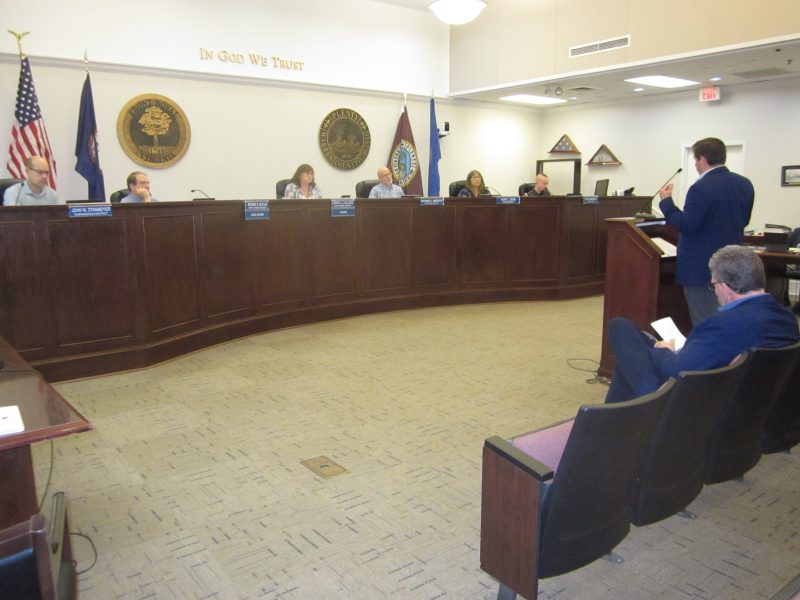
As reported of last week’s special meeting of the board, facing a $7.5 million revenue shortfall on the initially proposed FY-25 budget, the board has targeted tax hikes adding $4 million of revenue, leaving a $3.5-million shortfall the board seems committed to eliminate through further cuts to what they consider non-essential departmental or outside agency requests.
And speaking of requests, the board’s “Unfinished Business” opened the action portion of the meeting agenda with three staff presented contract proposals. Two of them were for renewals or updates of existing contracts, and one regarding tourism promotion from a Request For Proposal (RFP) issued by the County. Those contract items were, in the order presented:
- Contract – ACOM, LLC Contract for Technical Services – staff presentation by Todd Jones, IT Director (20:50 linked video mark); on a motion by ‘Jay’ Butler, second by John Stanmeyer, approved by a 4-1 vote, Ms. Cook dissenting.
- Contract – Earthdiver, LLC Contract for Tourism Website – staff presentation by Joe Petty, County Director of Economic Development (1:05:53 video mark); on a motion by Ms. Cook, second by Richard Jamieson, approved by a 5-0 vote.
- Contract – Civicplus, LLC Renewal of Annual Term Contract – staff presentation by Todd Jones, IT Director (1:09:48 video mark); on a motion by Ms. Cook, second by Mr. Butler, approved by a 5-0 vote.
While the latter two proposals were approved after brief discussions by the board following the staff summaries, the ACOM LLC computer tech services contract drew a lengthy inquiry and questioning of contract dynamics from Fork District representative Cook (beginning 32:42 video mark). The Fork District representative seemed troubled by the condition allowing the contractor to approach the board for additional funding if its annual cap, $35,000 in current FY-2023/24, $34,000 of which has been spent to date Jones told the board, was surpassed. Her mind did not seem eased by the fact a board of supervisors majority must approve the requested additional funding, as well as approve any IT project that arose where funding over $50,000 would be required, as in IT wiring to a new building. IT Director Jones noted the contract wording had been crafted to allow other Virginia municipalities to access needed IT services from ACOM through the Warren County contract. Jones noted such open contracting was a common practice in the state, and helped achieve the best possible pricing through the multiple municipal contracting availability.
The board also heard from ACOM principal Rob Adanitsch (23:50 video mark), who noted the company engaged in proactive community projects like IT instruction for high school students through Samuels Public Library, and contributions to tech-based student scholarships.

Staff, including IT Director Todd Jones at podium and applicant, seated, listen as Supervisor Vicky Cook, top left, questions financial variables in ACOM LLC Technical Services contract renewal request. Below, ACOM principal Rob Adanitsch explained his company’s services and community involvement in bringing IT educational instruction to local students through Samuels Public Library, as well as tech-related scholarship contributions. Four out of five supervisors liked what they heard.
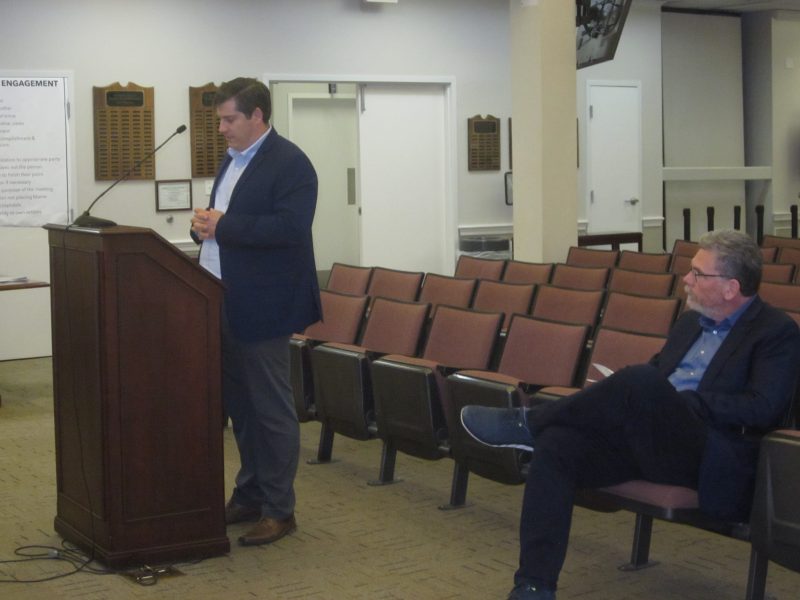
And as noted above, if not Cook, a four-member majority was satisfied with the contract’s dynamics, voting to approve the contract extension for another fiscal year.
On a motion by Mr. Stanmeyers, second by Mr. Butler, the board then unanimously approved a four-item Consent Agenda as presented. Three of those items were Authorizations to Advertise for Public Hearing hangar leases at the County’s Front Royal Airport (FRR), the fourth a Sole Source Award Notice precluding the necessity of issuance of an RFP on a specific pending item.
About that Liaison Committee
The meeting concluded with another somewhat lengthy exploration initiated by Supervisor Cook when Chairman Cullers asked if anyone had any “Additional New Business” to discuss (1:11:05 video mark). Cook expressed some confusion, not only on how board or council members not scheduled as official Town-County Liaison Committee members at a given meeting may offer input, but on the current structure of the liaison committee membership. The Front Royal-Warren County Liaison Committee, which generally meets quarterly, is composed on a permanent basis of the supervisors chairman and the town’s mayor, and one additional county board member and council-person generally rotated alphabetically by the first letter of their last name. The county administrator and town manager are also recognized as permanent members. Other supervisors and council members may attend Town-County Liaison Committee meetings as observers, with no authority to offer input unless recognized by the liaison meeting chairman. The meeting chairmanship is based on which municipality is hosting that quarterly meeting.
In response to Cook’s question on submitting input, Chairman Cullers recounted her experience as board chairman with the recent evolution of liaison committee meetings as the County and Town contemplated creation of a “Joint Tourism System”. She noted that while full board and council attendance had developed during the Joint Tourism discussion, the rules voted and agree upon in December were to return to the two-and-two board/council member format at liaison committee meetings moving forward. Consequently, she had communicated that non-participating board members should submit any questions or points they wanted discussed at liaison to her through the board clerk prior to the date of the next liaison meeting.

Board Chairman Cheryl Cullers, left, and Vicky Cook, right, were not on the same page on Town-County Liaison Committee structure and processes near the end of Tuesday’s meeting. County Attorney Jason Ham, below right, backed up Cullers explanation that the liaison committee has returned to the one-permanent (board chair and mayor) and one-rotating elected bodies liaison committee membership.
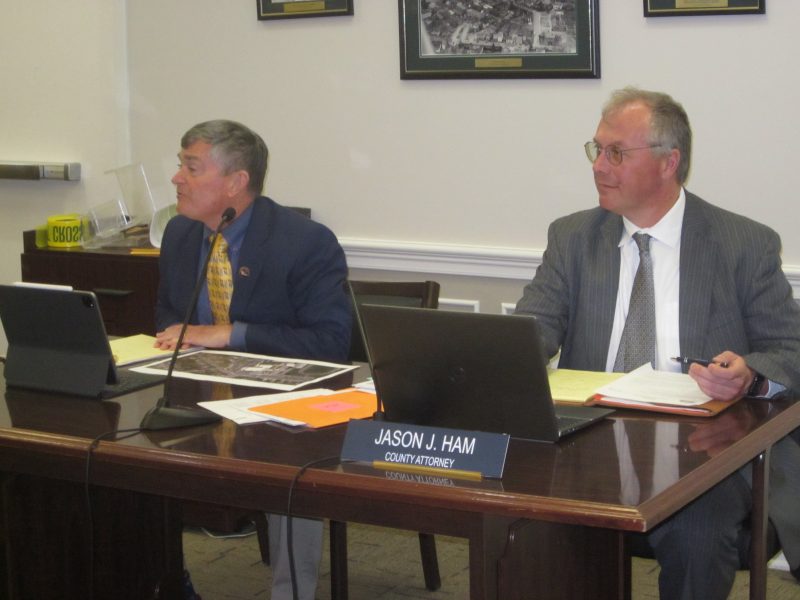
After County Attorney Jason Ham explained the legal rights of non-participating board or council members to attend and observe, but not speak unless recognized by the chair to do so, Cook insisted that full board and council membership was the existing structure of the liaison committee (1:17:40 video mark), to which both Ham and Cullers simultaneously disagreed. However, that did not initially deter Cook from continuing her comment based on an erroneous assumption she asserted she had written proof of.
Cook’s confusion seemed to stem from the fact she was allowed to speak at a liaison committee meeting she attended in January. Board Chairman Cullers explained to Cook that Mayor Cockrell, chairing that meeting hosted by the Town at Town Hall, recognized she had a question and had allowed her to pose it from the viewer’s gallery as a chairman may allow meeting rules to be exempted on occasion as they see fit.
And with that resolved the meeting adjourned just shy of 8:30 p.m.
Click here to watch the Board of Supervisors Meeting of April 16, 2024.
Local Government
County Planning Commission Blesses New Montessori School Proposal at Bowling Green South, and Short-Term Rentals
A near-capacity crowd of over 100 interested citizens filled the Warren County Government Center Meeting room as the County Planning Commission met for its regular meeting on April 10th. The primary interest of the crowd was a public hearing on a Conditional Use Permit (CUP) application filed by John Paul the Great Montessori Academy for a private school in Rockland. Last month, the commission saw a preview presentation in anticipation of the request for a new CUP on a 20-acre portion of the site of the former Bowling Green South Golf course at 768 Bowling View Road, which ceased active operations in 2023. The last CUP issued for that property was in 1981 to Linwood Morrison for a golf course.

County Planning Commission blesses new Montessori School proposal at Bowling Green South and short-term rentals
The Academy was established in 2020, and currently operates in town, with 141 students, 20 full-time, and 18 part-time employees. In its presentation, the applicant indicated the utilization of outdoor space for recess, sports and athletics, recreation, and development of occupations relating to livestock, husbandry, farming, and gardening. The academy does not propose to build new structures but will utilize the existing space and clubhouse structure. Planning Director Matt Wendling told the commission that the proposed use is compatible with the County’s Comprehensive Plan, but in an Agriculturally-zoned area does require a CUP. It is also not contiguous with the Town of Front Royal’s water and sewer network, so it is served by its own private well and septic systems. The majority of the 20-acre plot would be kept as open space. Preservation of the rural character of the county is a key part of the Academy’s mission, according to Noel Sweeney, representing the Academy in addressing the commission.

Applicant representative Noel Sweeney addresses the County Planning Commission to detail plans for a Catholic Montessori School on part of the site of the former Bowling Green South Golf Course, which ceased operations in 2023.
The Academy plans on “utilizing certain portions of the existing golf course for two sports fields and expanding the parking area to accommodate an additional 50 cars.” The student population will not exceed 200. Traffic study calculations provided by the applicant’s consulting engineering firm indicate that traffic to and from the site should be reduced by half from what it was as an active golf course. Compared with other uses that would be permitted by right on that property, such as a wine tasting room or brewery tap room, the school will generate far fewer weekday trips, and almost none on the weekends. Mr. Sweeney reiterated that the Academy has engaged Rockland area residents in dialog regarding the planned use and will continue to do so.
When Chairman Robert Myers opened the public hearing, the overwhelming majority of speakers enthusiastically supported the plan. The very few cautionary comments from citizens did not oppose the school’s plan, but recommended County review to enforce the speed limit on Rockland Road, to protect existing access easements, and review any other traffic control measures to ensure the safety of residents in the area.
After more than 25 speakers had addressed the commission, Chairman Myers closed the public hearing, and the commissioners had the opportunity to ask questions and clarify the conditions of the CUP. Vice-Chairman Henry reflected on the potential need for future accessory structures such as barns or sheds that could be built under an Agricultural exemption, and eventually have power run as necessary for potentially different uses. The commission concluded that without creating too much burden on the applicant, there should be a review mechanism in case additional facilities need to be built that are not foreseen now. After extensive discussion, Planning Director Wendling offered to amend the motion to include a 50-foot setback on accessory structures larger than 256 square feet, and a consent item for modifications to the site plan for review. On a motion by Vice-Chairman Henry, seconded by Commissioner Kersjes, the commission voted unanimously to recommend approval to the County Board of Supervisors. The supervisors will consider the CUP application at their meeting on May 7th.
In other business, the commission considered three other CUP requests.
Joel Didriksen has requested a CUP for a Short-Term Tourist Rental at his property at 3017 Blue Mountain Road in the Blue Mountain Subdivision. The property is zoned Residential-One (R-1) and is in the Shenandoah Magisterial District. Zoning Administrator Chase Lenz told the commission that the applicants have extensive experience managing short-term rentals in Washington D.C., and the Blue Mountain POA Board of Directors has submitted an approval for the permit. The property meets the county’s setback requirement with the nearest dwelling 185 feet to the east.

Conditional Use Permit applicant Joel Didriksen addresses the commission to explain his Short-term tourist rental in the Blue Mountain subdivision. The commission went on to unanimously approve the request.
The applicant told the commission that he and his partner bought the blighted property out of foreclosure and have restored it for their own use as well as a tourist rental. With little discussion, on a motion by Vice-Chairman Henry, seconded by Commissioner Kersjes, the commission voted unanimously to recommend approval.
Jennifer Wynn has submitted a request for a CUP for a Short-Term Tourist Rental at 703 Sunset Village Road. The property is zoned Residential (R-1) and located in the Junewood Estates Subdivision and the Fork Magisterial District. The property does meet the setback requirements of the county’s short-term rental ordinance, with the nearest dwelling 250 feet to the east. The Warren County Health Department review of the request indicated that there are 10 trees planted on the property’s drain-field (that also services an adjoining property by easement) that must be removed prior to final approval by the Board of Supervisors. The applicant indicated the trees would be removed. Without further discussion, on a motion by Commissioner Kersjes, seconded by Vice-Chairman Henry, the commission voted unanimously to recommend approval of the CUP with the added condition of the tree removal.
Jack Donohue – a request for a conditional use permit for a Contractor Storage Yard at (0) Winners Court in the Walker-Brugh Subdivision and the North River Magisterial District. The property is zoned Industrial. Zoning Administrator Lenz told the commission that the property was leased and is being used to store materials and equipment to service the landscaping business on the adjoining parcel. A previous CUP application for that property was approved in 2017, but the use as a Contractor Storage yard was never established, so the CUP expired after two years. There were no speakers at the public hearing. Planning Director Wendling told the commission that the Department heard from the adjoining property owner on the south side of the subject property requesting a visual barrier screening between the two properties, and that requirement was included in the conditions of the permit. On a motion by Commissioner Kersjes, seconded by Commissioner Kaylee Richardson, the commission voted unanimously to recommend approval.
All the requests recommended for approval will now go to the County Board of Supervisors for final action.
The Consent Agenda consisted of an authorization to advertise a public hearing for six items:
Andres Barkil-Oteo – A request for a CUP for a Short-Term Tourist Rental. The property is located at 351 Donna Court. The property is zoned Residential (R-1) and located in the Shenandoah Farms-Riverview Subdivision in the Shenandoah Magisterial District.
Fred & Christine Andreae (Lynx Properties, LLC) – A request for a CUP for a Short-Term Tourist Rental at 6331 Page Valley Road. The property is zoned Agricultural (A) and located in the South River Magisterial District.
Pennoni, Inc. – Mike Artz – A request for a conditional use permit for a Building Height in Excess of 40-feet within the Highway Corridor Overlay District and Commercial Zoning District for a proposed building height of 55 feet. The Commercially (C) zoned property is located at (0) Hospitality Dr. in the Blue Ridge Shadows Subdivision and in the North River Magisterial District.
William Johnson – A request for a CUP for a Short-Term Tourist Rental at 381 Thompson Hollow Road. The property is zoned Residential-One (R-1) and located in the Thompson Hollow Acres Subdivision in the South River Magisterial District.
Michaun Pierre – A request to amend Chapter 180 of the Warren County Code to amend §180-8C to add definitions for Camping Unit and Tent, to modify the existing definitions of Commercial Campground and Commercial Camping, and to repeal the existing definitions of Unit Space, Vacation Camp, Day, and Vacation Camp, Overnight, to amend §180-21D to modify the listed Commercial Campground use and to repeal the listed Vacation Camp, Day/Overnight use in the Agricultural District Regulations, to amend §180-27D to modify the listed Commercial Campground use in the Commercial District Regulations, to amend §180-41 to modify the existing supplementary regulations for Commercial Campgrounds, and to amend §180-57 to repeal the existing supplementary regulations for Vacation Camp, Day or Overnight.
Warren County Planning Staff – A request to amend Chapter 180 of the Warren County Code to amend §180-21 to make Public Schools permissible only by Conditional Use Permit in the Agricultural (A) District; to amend §180-25 to make Store/Dwelling Combination and Library permissible only by Conditional Use Permit in the Village Residential (VR) District; to amend §180-26 to add Church as a use permissible only by Conditional Use Permit in the Suburban Residential (SR) District; and to amend §180-28 to add Church as a use permitted by right in the Industrial (I) District.
The commission voted unanimously to authorize advertisement for public hearings at the next commission meeting.
The meeting adjourned at 8:56 p.m.
Click here to watch the Warren County Planning Commission Meeting of April 10, 2024.
Local Government
Conservatism of Supervisors Challenged by Urgent Need to Raise Tax Rates
Five different representatives of Warren County departments stood before the Warren County Board of Supervisors at a special meeting on Tuesday, April 9, starting at 6 p.m. in the Warren County Government Center at 220 North Commerce Avenue, to explain critical funding needs that they are facing as the County gears up for the 2024/2025 fiscal year. Considering the restraints the local government is operating under with a cost that is two million dollars more than revenue, these critical funding needs come at a time when the only way to cover them, or pragmatically, a portion of them, is to raise tax rates, which is odious to a board that is characterized by conservatism. However, having heard these presentations as well as input from a public hearing, the board sought to strike a balance without sacrificing its core values.
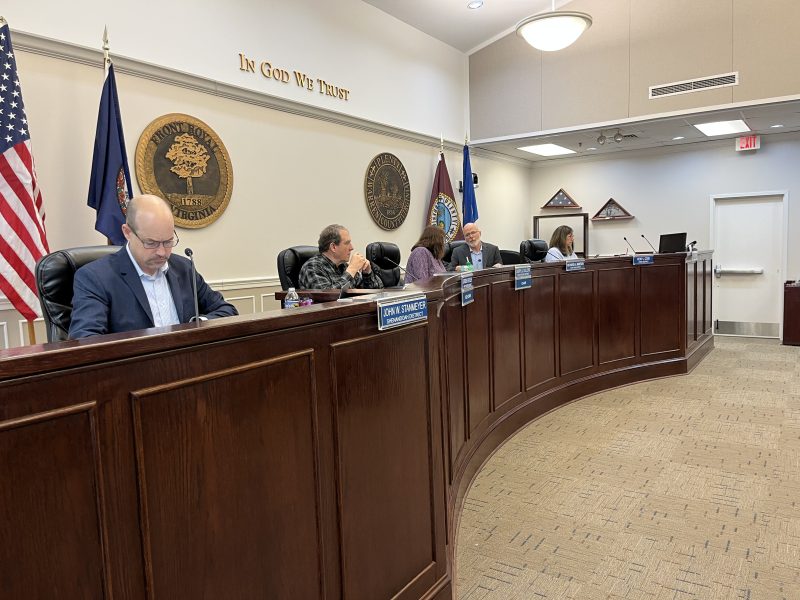
The Warren County Board of Supervisors meets for a special meeting on the evening of April 9. Royal Examiner Photo Credits: Brenden McHugh.
The amount of unfunded service needs presented to the board totals $7,531,756 which stands apart from any cost the County already has. That number is divided into separate categories based on the needs of the various departments, making this “ask”. In an arrangement of possible tax rate increases presented to this reporter by County Administrator Edwin Daley upon arriving for the meeting, amounts of potential revenue are calculated based on increases of one or more cents alongside the percentage those increases represent. In the categories of real estate, machinery and tools, and personal property, the board had a consensus that a selection of tax rate increases needed to be made at that meeting, as kicking the can down the road is no longer feasible. In real estate, which is set at $0.49/$100 assessed, a motion from Supervisor Jerome Butler selected an 8% increase of $0.04 to make $0.53, generating $2,400,000. Accompanying this figure in machinery and tools where the baseline is $2.05/$100 assessed, Butler’s motion selected a 6% increase of $0.12 to make $2.17, generating $96,000. Finally, in a personal property where the baseline is $4.00/$100 assessed, Butler’s motion selected a 7% increase of $0.28 to make $4.28, which generates $1,540,000. Add these figures up and you get roughly $4,000,000. The motion passed with only one “no” from Supervisor Vicky Cook, who felt that a selection of rates that would generate $3,000,000 would be more appropriate.

Chief James Bonzano of Warren County Fire and Rescue addresses his department’s needs with the board.

Sheriff Crystal Cline of Warren County Sheriff’s Office addresses the board concerning her department’s needs
So, the County is now facing a $4,036,000 tax revenue that will assist them greatly as they determine on every front what they can cut and what is imperative. This is the figure that results from computing the rates on the sheet provided by Daley. The money may help Chief James Bonzano in the Fire and Rescue Department to buttress the number of people they employ so that when disasters like the recent wildfires occur, their resources are not stretched to the breaking point; it may help Sheriff Crystal Cline at the Sheriff’s Office to provide her team with the vehicles they need as well as the ballistic vests they need, along with a replacement of a camera system and the execution of final payment on radio equipment; it may help Todd Jones in Information Technology as he seeks to keep his resources in fine working condition and optimally secure; it may help Alisa Scott in Finance and Purchasing as she negotiates asset replacement needs; and it may help the superintendent at Warren County Public Schools as they deal with issues ranging from covering the cost of substitutes to making sure the playgrounds are well mulched.

Director of Technology Todd Jones of Warren County Information Technology addresses the board concerning his department’s needs.

Finance Director Alisa Scott of Warren County Finance and Purchasing explains to the board a list of asset replacement needs, grouped under “other assets” in the list of categories for which the board was considering raising tax rates to cover.

Finance Director Robert Ballentine of Warren County Public Schools addresses the board concerning the school system’s needs.
Supervisor Richard Jamieson spoke at length in comments from the supervisors before the vote. “This is a surreal situation,” he said. “I was elected. I said I was a lifelong conservative. I am a conservative.” He sympathized with every citizen who spoke in the public hearing against raising taxes. “I am that person,” he said. “But I didn’t never campaign to raise taxes; I campaigned to prioritize county government working within its means to manage taxes.” He went on to say: “Lest anyone think I’m naïve about financing, I’ve been a businessman for thirty-plus years.” Although he recognizes its imperfections, he sees how much potential this county has. “The people presently running the county care about the county; they want the county to thrive. They want the county to be healthy.” But he sees the county at a place where it can no longer kick the can down the road. And, of course, the county cannot print money. He is fully aware of the ghosts that haunt this community, like the EDA scandal and the questions about how the school system uses money. But we are not helpless. He recalls his campaign slogan: “Deal responsibly with the past and plan for the future.” If leadership requires an uncomfortable decision like the one the board had to make on Tuesday evening, then that decision must be made, in Jamieson’s view. Help us comb through the budget at future meetings, he urged the audience. Perhaps Jamieson discovers Warren County as Margaret Thatcher discovered England: either regulated in all the wrong ways or not where regulations are desperately needed. The analogy certainly extends to the willingness to be hated in the line of duty.
Having voted in favor of the tax increase, the board adjourned at 9:15 p.m.
Click here to watch the Board of Supervisors Meeting of April 9, 2024.
Local Government
Closure Sighted on the Horizon for Town Council’s Ongoing Discussion of Poultry in Urban Agriculture
Among several items on the Front Royal Town Council’s agenda for Monday, April 8, starting at 7 p.m. in the Front Royal Town Hall at 102 East Main Street, was a revisitation in this work session for the final time before a vote at the council’s regular meeting on May 27, of a proposed amendment to Town code regarding poultry in urban agriculture. This is an issue that has sometimes sparked contentious discussions between council members. Councilwoman Amber Morris has spoken at length, expressing strong views in favor of a more hands-off policy on regulating urban agriculture, specifically as it relates to poultry.
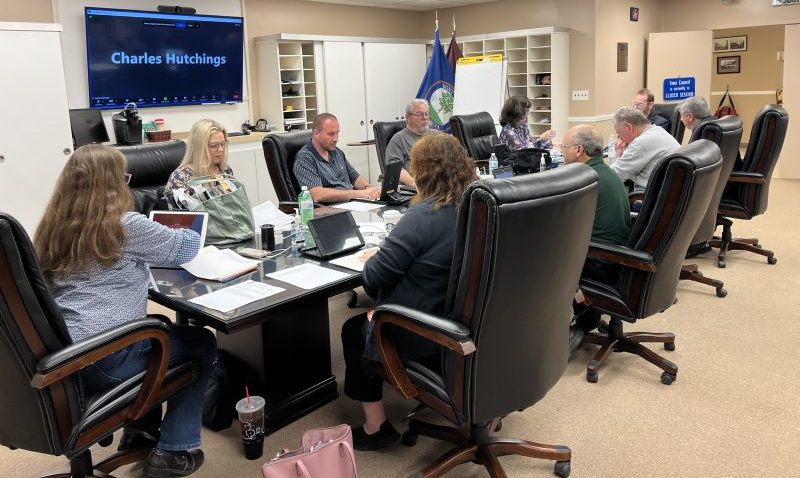
Town Council meets for Monday night work session. Royal Examiner Photo Credits: Brenden McHugh.
As Planning Director and Zoning Administrator Lauren Kopishke explained to the council, staff has discovered contradictions in the Town Code pertaining to urban agriculture, and it stands in need of revision, regardless of whether the council reaches a consensus about the number of chickens allowed within Town limits and the square footage for coop and run space required. Councilwoman Morris acknowledges that she may not win this point. Still, she maintains that the requirements for four square feet of coop space per chicken and eight square feet of run space per chicken, requirements that are already practiced but not codified and would be codified by this amendment, are unreasonable. She would like to see chickens have the liberty to free-range in urban agriculture. However, the amendment would enforce the keeping of poultry in an enclosed, covered, secure, movable, or stationary coop, always with the requirements in terms of square feet. If the amendment passes, the number of chickens allowed for any permit holder will remain at six.

The council undertakes a virtual VDOT presentation. Adam Campbell of STARS (Strategically Targeted and Affordable Roadway Solutions) presents to the council on behalf of VDOT proposed solutions for safety concerns in the 340/522 corridor.
“When we ask this of Council,” Kopishke said of herself and her fellow staff members in an interview, “there is no corruption or malice behind the ask, no ulterior motive. It simply lets us reduce conflicts in the code so that we can do our jobs.” Aside from unifying, condensing, and removing discrepancies in the code, codifying the square footage requirements would give teeth to a practice already in place. Kopishke says that when permit holders do not abide by the uncodified requirements, inevitably, problems will arise that staff can address, like the accumulation of feces in a confined space. “Staff wants these policies standardized so that we can ensure these animals won’t be kept in anything less,” Kopishke went on. “So that when we go back for reinspection, we can ensure the welfare of the animal is being maintained.” She adds: “I can’t guarantee that when someone walks out the door with their approval, they built that coop and ran to our standards until I put eyes on it. Typically, that’s one year later unless I receive a complaint.”
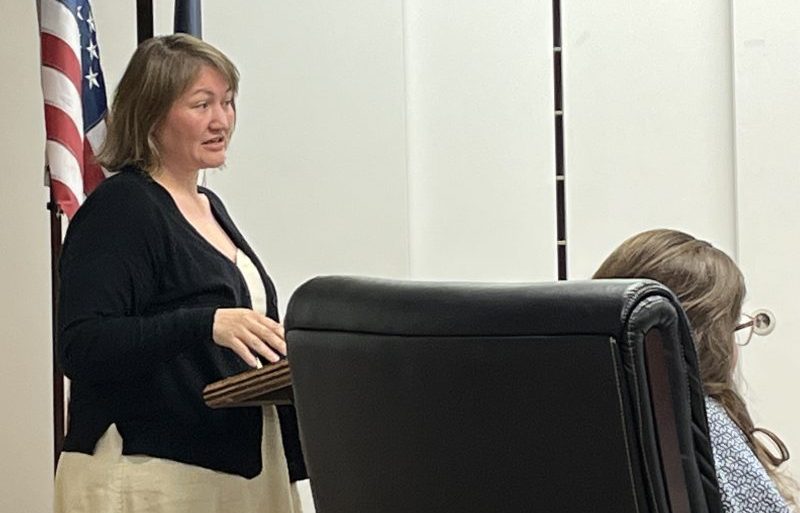
Planning Director/Zoning Administrator Lauren Kopishke stands before the council twice on Monday evening to present a proposed edit and streamline of ordinance regarding spot blight abatement as well as an amendment to Town code related to urban agriculture.
Having discussed other complicating factors like whether commercial use would be allowed, which would not be under the proposed amendment, the council resolved to vote on this item at the May 27 regular meeting, as April’s regular meeting is coming soon enough that staff would not be able to advertise for the public hearing properly. Upon completing their agenda at 9:30 p.m., they went into a closed session.
Click here to watch the Front Royal Town Council Meeting of April 8, 2024.
Local Government
Labor Pangs Attend Delivery of New Congregation to Warren County Community
En route to Eastham Park, known to those who frequent it as “the dog park”, one passes at the corner of West Criser Road and Luray Avenue a plot of undeveloped land which will soon be the site of a Catholic church. This development has occupied the attention of both the Front Royal Town Council and the Warren County Board of Supervisors for months. While an application to the board for a conditional use permit for a church sailed smoothly and unanimously through the board’s regular meeting on the evening of April 2, the applicant has encountered speed bumps with the Town Council regarding a request for out-of-town water and septic service at 0 Criser Road.
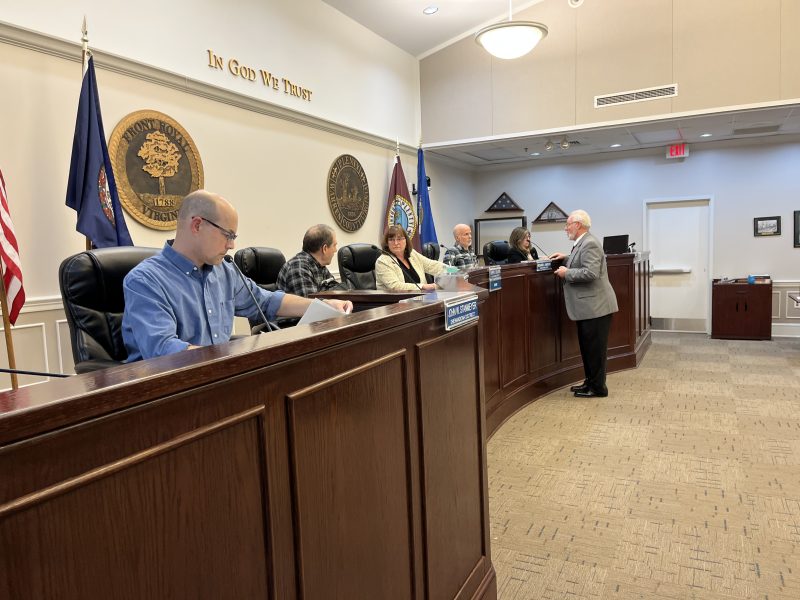
Warren County Board of Supervisors held a regular meeting on Tuesday, April 2, at the Warren County Government Center. Royal Examiner Photo Credits: Brenden McHugh.
Dedicated as St. John the Baptist and owned by the Catholic Diocese of Arlington behind the two applications respectively to town and county, this development will arguably create a mirror image of the existing sanctuary at the other end of Luray Avenue, opposite Maddox Funeral Home, which is also dedicated as St. John the Baptist. Considering how many parishioners it serves and how busy that end of Luray Avenue is on Sundays, it stands to reason that an additional chapel could help with overflow. The request for out-of-town water and septic service comes from the Diocese with the Board of Supervisors, as 0 Criser Road is in the county outside of Front Royal town limits.

Marisa Whitacre of Greenway Engineering speaks to the board on behalf of an applicant for a conditional use permit pertaining to a church at the corner of West Criser Road and Luray Avenue.
In her address to the board on Tuesday evening, Marisa Whitacre of Greenway Engineering, speaking on behalf of the applicant and having answered questions from the council the previous evening, told the supervisors that it appears the council plans to vote in favor of granting the out-of-town service request at their regular meeting on April 22. However, the applicant has made it clear that if the request is not granted, they will acquire the appropriate approvals for service via a private drain field.
The council has considered this out-of-town service application throughout multiple work sessions. In more than one instance, their discussion has focused on the need for a sidewalk on West Criser Road adjacent to the location at 0. At the most recent discussion on Monday evening, Town Manager Joe Waltz said emphatically that the real priority is securing a sidewalk on the portion of West Criser where students are currently walking in the road between Skyline Vista Drive and Route 340. Up to that point, the hypothetical sidewalk adjacent to 0 governed the council’s thought process. In what cases, they asked each other, would the council be justified in requiring the applicant to build a sidewalk, or how could they persuade the applicant to do so without a requirement? In the case of a boundary line adjustment to Town limits, the applicant would indeed be required to develop a sidewalk, as they would then be within Town limits and would therefore be subject to all the requirements facing development on a parcel located in the town. In the absence of a boundary line adjustment, persuasion becomes necessary. Could the council bargain with the applicant, resulting in a sidewalk? At one point, the applicant offered to provide a financial gift to the Town to defray a sidewalk’s expense and pay a percentile of the final cost. Still, as the size of the expense became clearer, along with logistical considerations, that gift and that assistance began to appear insufficient.
Having ruled out a boundary line adjustment and identified the need to legally add 0 Criser Road to the list of areas outside the Town that can receive service, Monday night’s work session for the council ended with the sidewalk unsecured and the appearance that, nevertheless, consensus will be had in a vote in favor of granting the out-of-town water and septic service to the applicant at the council’s April 22 meeting.












